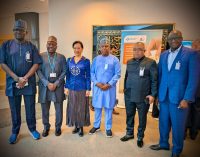The Kano State Government, through the Kano State Agro-pastoral Development Project KSADP) has disclosed that it spent about N800 million to conduct various training programmes for the project’s stakeholders, including direct beneficiaries and workers, saying the measure is part of the broader objective of the project to reintroduce Artificial Insemination, towards ensuring sustainable livestock development in the state.
KSADP Project Communication Specialist, Ameen Yassar, who stated this through a statement issued to newsmen on Saturday, said the training aims to ensure that the beneficiaries can effectively contribute to executing the project’s development objective and ensuring sustainability after the project’s closure.
Yassar said in the statement that the KSADP project coordinator, Ibrahim Muhammad, disclosed this during the opening of a training workshop at Kadawa Artificial Insemination Centre on Friday.
“The training supported by the project is on Animal Insemination for animal husbandry technicians and other livestock staff of the Kano State Ministry of Agriculture,” it said.
“The various capacity building programmes enhanced the skills, knowledge and resources of the beneficiaries,” the Project Coordinator was quoted as saying.
Notably, on the artificial insemination training, he said,” it is part of the broader objective of the project to reintroduce Artificial Insemination, towards ensuring sustainable livestock development in the state.”
The project coordinator said, besides renovating the Kadawa Artificial Insemination centre, procuring five exotic bulls and providing modern equipment, the KSADP, funded by the Islamic Development Bank and the Lives and Livelihoods Fund, is supporting the training of the workers for efficient service delivery and sustainability of the centre, which was hitherto abandoned.
“Just recently, we saw the need to further upgrade the centre, so we have earmarked N125 million for this, which will include the provision of certain inputs, fence reconstruction, etc. We will also establish a two-hectare fodder farm in the vicinity of the centre for feed availability“, he added.
He urged the trainees to justify the investment by paying keen attention to the workshop modules, stressing that “the expectation of the project, for breed improvement and incremental milk production, will not be achieved if you do not work efficiently.”
Sulaiman Audu, one of the trainees, , expressed gratitude to the Islamic Development Bank and the Lives and Livelihoods Fund for facilitating the training, pointing out that it will impact on their work and career.
The capacity building workshop, conducted in collaboration with the Federal College of Agricultural Produce Technology, Kano, involves comprehensive training in theoretical and practical aspects of artificial insemination, focusing on semen collection, freezing, and storage, as well as animal health, breed selection and record-keeping.
Kano remains one of the leading hubs of Nigeria’s livestock sector, with over 1.21 million agricultural households engaged in cattle, 1.46 million in goats, and 1.15 million in sheep. According to the recent sub-national GDP for Kano State, livestock contributed over ₦1.73 trillion in 2023.











